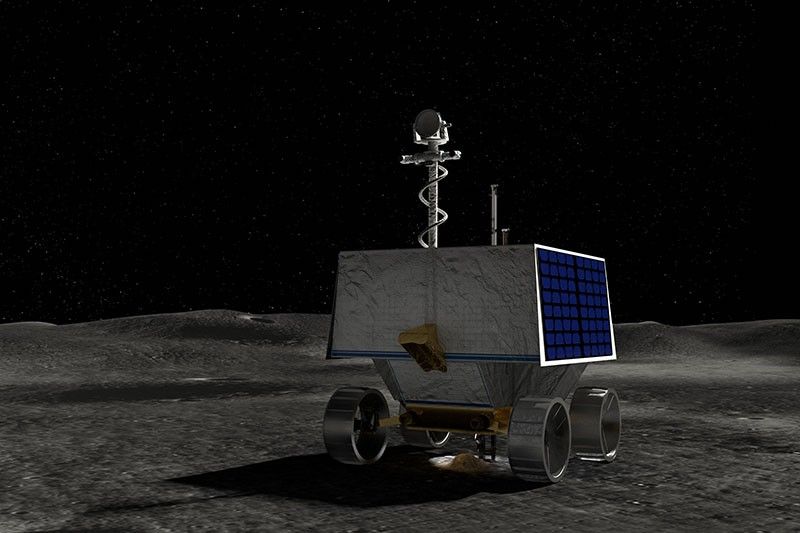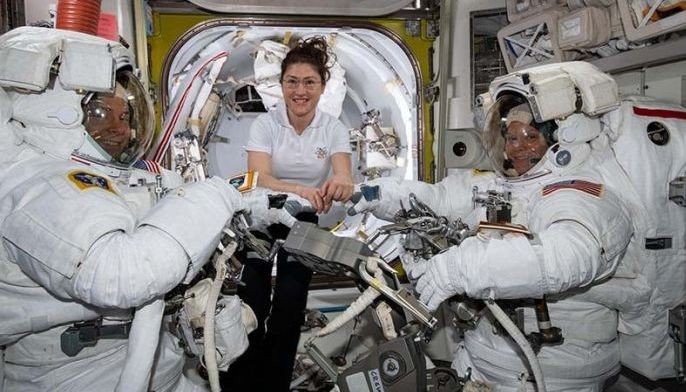NASA pushes back crewed Moon landing to 2025 or later

WASHINGTON, United States — The United States will send a crewed mission to the Moon "no earlier than 2025," NASA chief Bill Nelson told reporters on Tuesday, officially pushing back the launch by at least a year.
A target of 2024 was set by the administration of former president Donald Trump when it launched the Artemis program.
But the program has since faced numerous development delays ranging from its vehicles to the space suits required.
Last week, NASA won a court case brought by Jeff Bezos' Blue Origin which sued after losing a lander contract to Elon Musk's SpaceX.
"We lost nearly seven months in litigation and that likely has pushed the first human landing likely to no earlier than 2025," Nelson said on a call.
"The good news is that NASA is making solid progress," said Nelson, citing the fact that the mission's Orion crew capsule has since last week been stacked atop the giant Space Launch System rocket at the Kennedy Space Center in Florida.
NASA is targeting a first uncrewed mission, Artemis 1, in February 2022, and Artemis 2, the first crewed mission that will perform a flyby of the Moon, in 2024.
Separately, SpaceX needs to carry out an uncrewed landing to test out the lunar version of its Starship rocket, before the same vehicle is used for the crewed landing.
Nelson revealed NASA was committed to a total development cost for Orion of $9.3 billion, which encompasses the period between 2012 and 2024, up from the previous estimate of $6.7 billion.
- New space race with China -
But he warned more funding would be required from Congress to meet the new timelines, adding: "The Chinese space program is increasingly capable of landing Chinese taikonauts much earlier than originally expected."
"We are facing a very aggressive and good Chinese space program," he continued.
"It's the position of NASA, and I believe the United States government, that we want to be there first back on the Moon after half a century."
China, the world's second-largest economy, has put billions into its military-run space program, with hopes of having a permanently crewed space station by 2022.
It has already sent rovers to the Moon, including one to the far side, and is aiming for a first crewed lunar mission by 2029.
Humans last landed on the Moon in 1972 on America's Apollo 17 mission.
NASA says the Artemis program will include the first woman and first person of color to set foot on the surface of Earth's natural satellite.
The agency wants to build a sustained habitat on the Moon and use the lessons learned from long expeditions there to develop a crewed mission to Mars by the 2030s.
Monitor major developments on space explorations and the status of missions.
NASA reveals a sample collected from the 4.5-billion-year-old asteroid Bennu contains abundant water and carbon, offering more evidence for the theory that life on Earth was seeded from outer space.
The discovery follows a seven-year-round-trip to the distant rock as part of the OSIRIS-REx mission, which dropped off its precious payload in the Utah desert last month for painstaking scientific analysis.
"This is the biggest carbon-rich asteroid sample ever returned to Earth," NASA administrator Bill Nelson says at a press event at the Johnson Space Center in Houston, where the first images of black dust and pebbles were revealed. — AFP
NASA is set to reveal on Wednesday the first images of the largest asteroid sample ever collected in space, something scientists hope will yield clues about the earliest days of our solar system and perhaps the origins of life itself.
The OSIRIS-REx mission collected rock and dust from the asteroid Bennu in 2020, and a capsule containing the precious cargo successfully returned to Earth a little over two weeks ago, landing in the Utah desert.
It is now being painstakingly analyzed in a specialized clean room at NASA's Johnson Space Center in Houston. — AFP
A Spanish company launches the country's first private rocket on Saturday in a step towards bringing Spain into the exclusive club of space-faring nations.
The launch of the small MIURA1 rocket took place at 02:19 am (0019 GMT) from a military base in the southern region of Andalusia, according to the company, PLD Space.
The company hailed the launch as "successful" and said it had achieved all its "technical objectives". — AFP
India's Sun-monitoring spacecraft has crossed a landmark point on its journey to escape "the sphere of Earth's influence", its space agency says, days after the disappointment of its Moon rover failing to awaken.
The Aditya-L1 mission, which started its four-month journey towards the centre of the solar system on September 2, carries instruments to observe the Sun's outermost layers.
"The spacecraft has escaped the sphere of Earth's influence," the Indian Space Research Organisation (ISRO) says in a statement. — AFP
Carbon dioxide detected on Jupiter's moon Europa comes from the vast ocean beneath its icy shell, research using James Webb Space Telescope data, potentially bolstering hopes the hidden water could harbour life.
Scientists are confident there is a huge ocean of saltwater kilometres below Europa's ice-covered surface, making the moon a prime candidate for hosting extra-terrestrial life in our Solar System.
But determining whether this concealed ocean has the right chemical elements to support life has been difficult. — AFP
- Latest
































